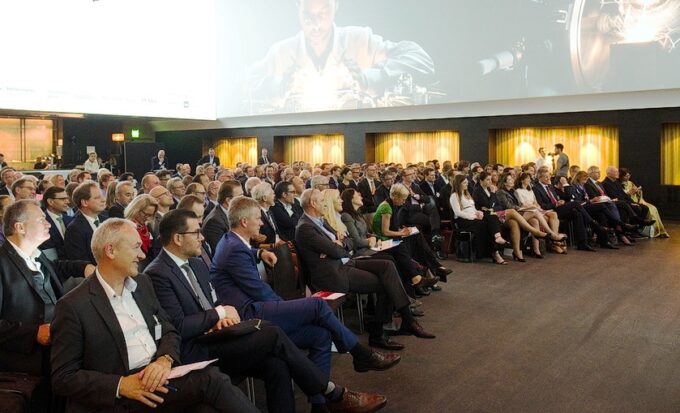Forum of the Swiss Management Society
Leading entrepreneurs met for the 54th Forum of the Swiss Management Association (SMG) on 8 September 2017. This year's topic was "The right timing" and questioned why timing determines success and failure.

The President of the Swiss Management Association (SMG) is Alice Šáchová. Introducing the Forum, Alice Šáchová re-quoted the former Kremlin boss Mikhail Gorbachov: "Those who are late are punished by life". There are companies like Karstadt or Kodak, which did not recognize the signs of the times. It is also possible to be too early, as AT&T's billion-euro investment in the Videophone had shown. Therefore, it is important not to be too early and not too late.
The right timing is crucial in both personal and business life. It can bring success or ruin. Šáchová: "We need to understand the diversity of techniques without leaving employees behind."
Jean-Claude Biver
Jean-Claude Biver has also succeeded in leading brands that had been shut down and thought dead, such as Blancpain and Hublot, to incredible heights. Now he is betting on digital development. The Swiss watch industry had slept through the trend of smartwatches, it was said time and again.
With the recent launch of the Tag Heuer Connected Modular 45, Jean-Claude Biver struck another stroke of genius in the spring and countered the dominance of the technology group Apple: "The technology of the smartwatch has a future. I believe in it. That's why we absolutely have to get in on the action and be in the race. That's where we'll see where it goes. If there's no future for it, we can get out again."
For this, Biver brought Intel and Google on board and brought the only Swiss digital watch to its greatest success.
Julia Kirby on obsolete jobs
Almost half of all US citizens could lose their jobs due to technological progress. The Swiss managers present were somewhat more positive about the possible consequences for Swiss jobs. Many areas are threatened by the accelerated progress in artificial intelligence (AI). How should we react to this?
"We can't stop this development - but we can help shape our future," says Julia Kirby, editor of the Harvard Business Review. She is not so worried about job losses: "Even if jobs are lost, new ones will be created. But when artificial intelligence comes along, the demands change. The different demands define the new jobs."
But she also raises a warning finger: "When competitors invest in artificial intelligence, managers should take a closer look." Goldman Sachs, for example, is investing specifically in artificial intelligence to improve existing processes, become smarter in business and better serve customers.
Daimler from automaker to mobility service provider
Until now, the existence of fully automated cars and those that manage entirely without a driver was still a long way off. At the beginning of April, the Daimler Group entered into a development cooperation with Bosch and is stepping on the gas. Such completely driverless systems could be ready for the market as early as the beginning of the next decade.
The transformation of mobility poses major challenges in the areas of law and ethics in addition to technical ones. Daimler is conducting a regular sustainability dialogue for the autonomous driving of the future, explains Renata Jungo Brüngger, Member of the Board of Management of Daimler AG and responsible for Integrity and Legal Affairs there:
"We need a social discussion on autonomous driving and good legal foundations. Business, society and politics must be involved in a discourse to create a good solution for the future."
Company succession: When is it time to hand over?
Company succession is one of the central strategic tasks for all entrepreneurs. However, successful succession planning is not only of central importance for the company itself, but also for the national economy. According to a study by Credit Suisse, one in five SMEs in Switzerland is planning a business succession by 2021.
These 70,000 to 80,000 companies account for more than 400,000 jobs, which corresponds to around 10 percent of all employees in Switzerland.
Albert M. Baehny and Franz Julen have already successfully mastered this challenge. Julen has been at the helm of the franchise company Intersport, which is organized as a cooperative with 13 franchisees, for 17 years. He has sensed from various experiences that it is time to let go. "Before making such a decision, you have to listen to your heart and thus do the best for yourself and the company," Franz Julen said. He made a consistent cut and renounced the presidency of the board of directors or the consultant status.
Albert M. Baehny swapped his position as CEO at Geberit for that of Chairman of the Board of Directors. He was aware that his time was limited from the outset. He defined four requirements for his successor - talent as a basis, open to new things, used to working under pressure and a good character to further promote and develop the Geberit culture. "If you want succession and start the process early, it's a nice job," says Baehny.
The Swiss Management Association emerged in 1961 from the Business Administration Institute (BWI) of the ETH. Schweizerische Management Gesellschaft (SMG) is the most important association of over 1200 leading decision-makers in the Swiss economy. Through its networking and platform function, the SMG serves as a source of inspiration for entrepreneurs, C-level executives and board members dealing with strategic and operational management issues.









